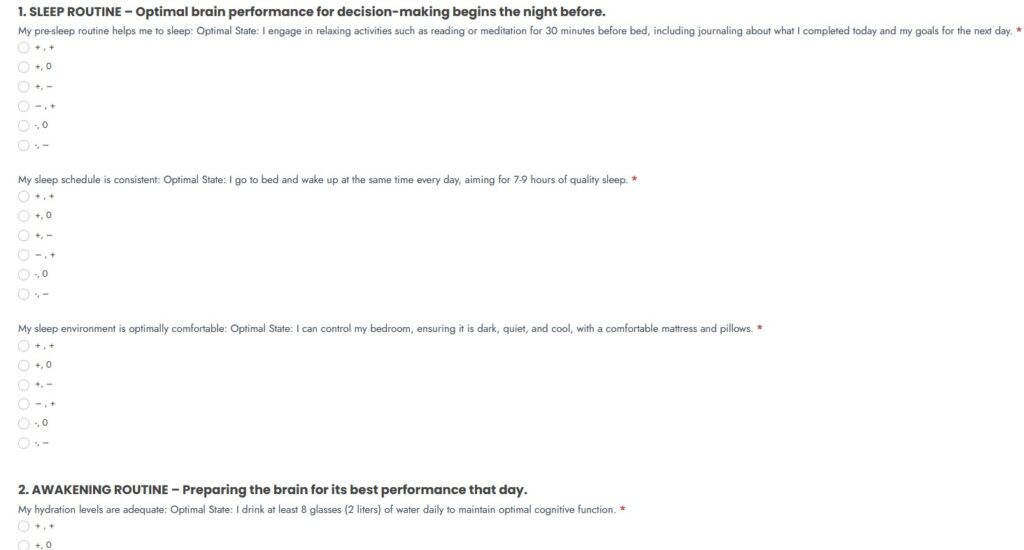Optimizing the brain for making decisions involves understanding and enhancing various factors that affect cognitive performance and mental clarity. It is the brain after all that is the source of the behavior of decision making. When it has the proper rest, time of day, nutrition, stress management, and exercise it needs, it is more likely to perform at an optimal level.
1. Rest and Sleep
Importance:
- Most Important: This topic is first because it is the most important. It is difficult, if not impossible, to overcome poor sleep, especially if it is over an extended period of time.
- Cognitive Function: Adequate sleep is essential for cognitive processes such as memory consolidation, problem-solving, and critical thinking.
- Emotional Regulation: Proper rest helps regulate emotions, reducing impulsivity and emotional decision-making.
- Energy Levels: Rested individuals have higher energy levels, which supports sustained mental effort during decision-making.
Optimization Tips:
- Consistent Sleep Schedule: Maintain a regular sleep schedule by going to bed and waking up at the same time each day. This can be a challenge in our modern world, however prioritizing consistency prior to upcoming bouts of decision making will improve performance.
- Sleep Environment: Create a comfortable sleep environment with minimal noise, low light, and a cool temperature.
- Pre-Sleep Routine: Establish a calming pre-sleep routine, such as reading or meditating, to signal to your body that it’s time to sleep. As more is learned about the impact of technology, the best thing to do is turn off the screen to optimize restful sleep.
2. Time of Day
Importance:
- Circadian Rhythms: The body’s internal clock affects alertness and cognitive performance, with most people experiencing peak mental performance in the morning. We all have good days and not, and often times they can be predicted by what has been going on the day before. Considering the time of day also means planning the day before to optimize decision making.
- Decision Fatigue: Cognitive resources deplete throughout the day, making complex decision-making harder later in the day. Just as muscles fatigue, so does the brain. To minimize errors perform the most complex decision-making in the morning and leave the little decisions for later in the day.
Optimization Tips:
- Peak Times: Schedule important decision-making tasks during your peak cognitive performance times, typically in the morning.
- Breaks: Take regular breaks to maintain mental freshness and prevent decision fatigue.
3. Nutrition
Importance:
- Brain Fuel: The brain requires a constant supply of glucose for energy. Nutrient-rich foods support optimal brain function. Although only 2% of body mass, the brain uses between 20-25% of the total energy of the body in a day. The brain is very sensitive to decreases in blood sugar, and will rapidly down-regulate from the deliberate system to the automatic system to attain food to raise blood sugar. Simply put its not a good idea to make decisions when hungry.
- Cognitive Clarity: Proper nutrition helps maintain cognitive clarity and focus, which are crucial for deliberate decision-making. This can include making sure there is enough B vitamins in ones diet, as they play an important role in the function and performance of the nervous system.
Optimization Tips:
- Balanced Diet: Eat a balanced diet rich in fruits, vegetables, lean proteins, whole grains, and healthy fats.
- Hydration: Stay hydrated throughout the day as dehydration can impair cognitive function.
- Healthy Snacks: Keep healthy snacks like nuts, fruits, and yogurt available to maintain energy levels during decision-making sessions.
- Use caffeine sparingly: A cup of coffee, energy drink or straight caffeine fuels our modern world. However it can have a negative impact on decision making when too much caffeine is ingested, leading to jitteriness and difficulty concentrating. The main action of caffeine is to interrupt the fatigue signaling mechanism in the brain. The chemical that signals to the brain that it is tired is repressed by caffeine. The brain remains in a state of fatigue but it does not know it, resulting in a tired brain performing.
- Don’t Drink and Decide: If caffeine revs up the world, alcohol is the great depressor. It acts to depress the activity of the brain, specifically the frontal lobes that are involved in judgement and risk assessment. So clearly this will not help the decision-making process. In addition, chronic alcohol use impairs sleep, changes emotional control and generally undermines the body and minds capacity to make decisions.
4. Stress Management
Importance:
- Cognitive Load: High stress levels can overwhelm the brain, leading to impaired decision-making and increased reliance on automatic responses. Even good stress can be impactful on decision-making leading to errors.
- Emotional Control: Managing stress helps maintain emotional control, which is vital for rational decision-making.
Optimization Tips:
- Mindfulness Practices: Incorporate mindfulness practices such as meditation, deep breathing, or yoga to reduce stress.
- Breaks and Downtime: Schedule regular breaks and downtime to relax and recharge.
- Work Environment: Create a calm and organized work environment to minimize stress triggers. Specifically consider building a Decision Space to create an optimal environment.
5. Exercise
Importance:
- Brain Health: Regular physical activity improves blood flow to the brain, promoting neurogenesis and enhancing cognitive function. Not only are the structures of the brain improved, so is the chemistry in the brain. Research has shown that exercise improves the mood chemistry levels of the brain.
- Stress Reduction: Exercise helps reduce stress and anxiety, contributing to a clearer mind.
- Mood Improvement: Physical activity boosts mood and energy levels, supporting sustained mental effort. With the improvement of serotonin and dopamine as a result of exercise, the brain has the chemistry to have improved moods.
Optimization Tips:
- Regular Exercise: Engage in regular aerobic exercise like walking, running, or swimming, at least 150 minutes per week.
- Active Breaks: Take short, active breaks during work sessions to boost circulation and mental clarity.
- Mind-Body Exercises: Include mind-body exercises such as yoga or tai chi to enhance both physical and mental well-being.
Integrating These Elements
- Create a Daily Routine:
- Start with a healthy breakfast rich in proteins and complex carbohydrates.
- Schedule high-stakes decision-making tasks in the morning.
- Take short breaks every 25-50 minutes to prevent cognitive overload.
- Use devices like the Pomodoro to monitor work duration.
- Include a nutritious lunch and stay hydrated throughout the day.
- Engage in regular physical activity, ideally in the afternoon or early evening.
- Practice stress management techniques like deep breathing or mindfulness during breaks.
- Ensure you get 7-9 hours of quality sleep each night.
- Optimize Your Decision-Making Environment with a Decision Space:
- Design a dedicated decision-making space that is quiet, organized, and free from distractions.
- Keep healthy snacks and water within reach to maintain energy levels.
- Use comfortable seating and ensure proper lighting to create a conducive work atmosphere.
- Read the article “Build Your Decision Space” for specific instructions.
- Monitor and Adjust:
- Pay attention to your body’s signals and adjust your routine as needed to maintain optimal cognitive performance.
- Regularly assess and refine your strategies for rest, nutrition, exercise, and stress management to support your decision-making process.
By integrating these elements into your daily routine, you can create an environment and lifestyle that supports optimal brain function and enhances your ability to make well-informed, deliberate decisions.
Free Optimization Self-Evaluation with Free Membership

Ready to start making better decisions?
